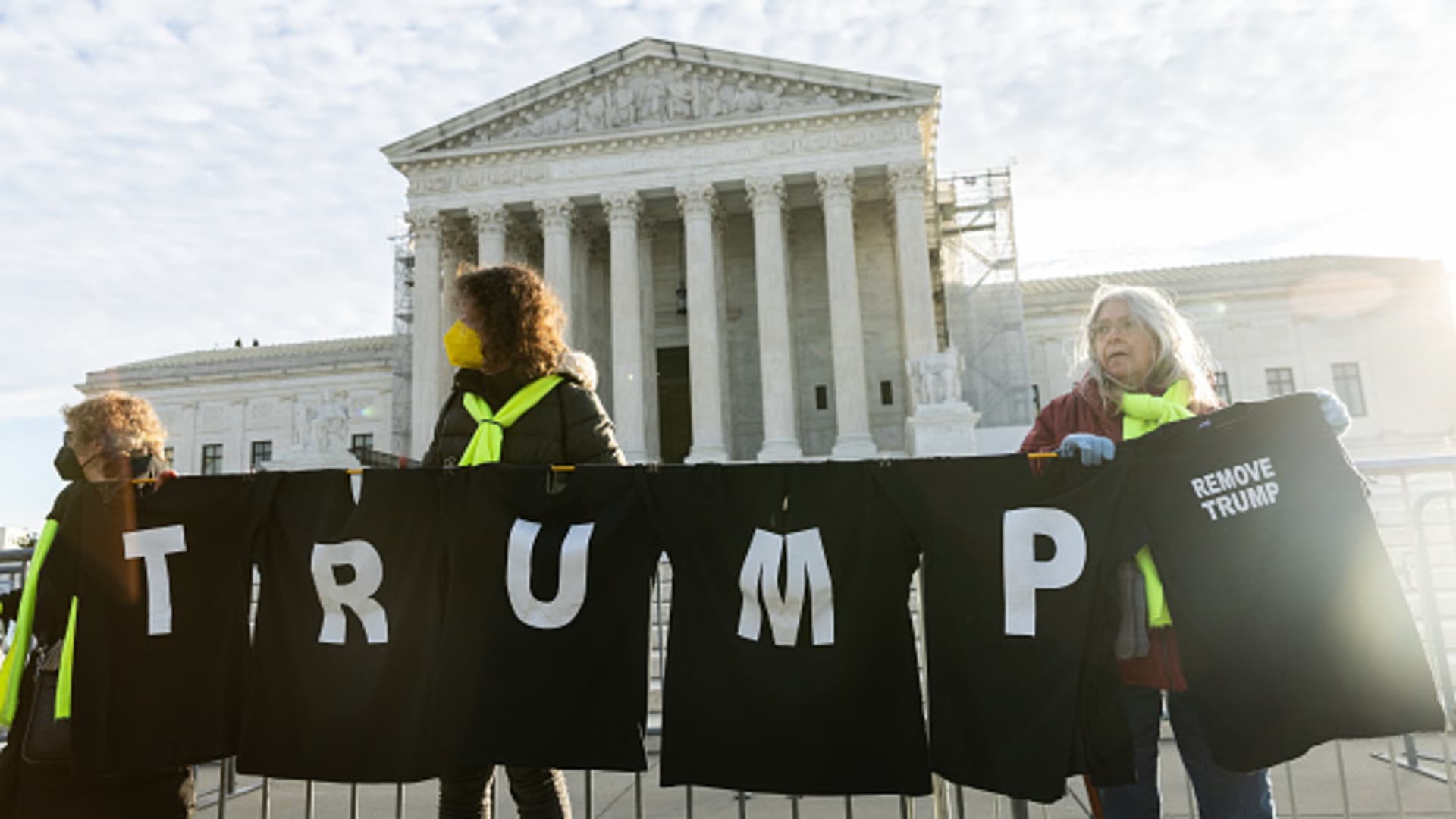The Supreme Court on Thursday strongly questioned a ruling by Colorado’s top court that barred Donald Trump from the state’s Republican presidential primary ballot.
A number of Supreme Court justices, among them two liberal justices, were skeptical of the rationale and process that the Colorado Supreme Court used to disqualify Trump from that ballot.
“I think that the question that you have to confront is why a single state should decide who gets to be president of the United States,” Justice Elena Kagan, one of those liberals, told a lawyer for Colorado voters who sought Trump’s disqualification.
She and other justices expressed concern about a lack of consistency across states in which some ban a federal candidate, while others allow the same candidate to remain on their ballots.
Oral arguments in the case, where Trump is seeking a reversal of the Colorado ban, ended after about two hours. It is not clear when the U.S. Supreme Court will issue its ruling.
Jason Murray, the lawyer for the Colorado voters, told the justices that Trump disqualified himself from becoming president again because he engaged in insurrection in his attempt to remain in the White House after losing the 2020 election.
“We are here because, for the first time since the War of 1812, our nation’s capital came under violent assault,” said Murray.
“For the first time in history, the attack was incited by a sitting president of the United States to disrupt the peaceful transfer of presidential power by engaging in insurrection against the Constitution,” Murray said.
“President Trump disqualified himself from public office,” the attorney said. As we heard earlier, President Trump’s main argument is that this Court should create a special exemption to section three that would apply to him and to him alone.”
But Murray was pressed by several justices on whether Colorado courts had failed to give Trump due process in litigating the case, and the potential problems from having one or more states barring candidates from ballots while other states kept those same candidates on their ballots.
Earlier Thursday, Trump’s attorney Jonathan Mitchell opened the hearing by telling the court’s nine justices that a president is not “an officer of the United States,” and therefore is not subject to the provision in the Constitution that Colorado’s Supreme Court cited in its ruling banning Trump from the ballot.
“Officer of the United States refers only to appointed officials and it does not encompass elected individuals such as the president or members of Congress,” Mitchell said.
He later argued that the Colorado Supreme Court had incorrectly found that the Jan. 6, 2021, invasion of the U.S. Capitol, which Trump had incited, was an insurrection that the former president engaged in.
“For an insurrection, there needs to be an organized, concerted effort to overthrow the government through violence,” Mitchell said. “This was a riot.”
Justice Clarence Thomas asked the first question of the hearing, about Mitchell’s argument that the constitutional provision is “not self-executing,” and requires a separate finding by Congress that someone engaged in insurrection.
Another justice, Sonia Sotomayor, later pressed the attorney on whether his argument against Colorado’s authority to review the qualifications of presidential candidates was “setting up” a later claim that a president could seek a third term in the White House without a state blocking such a candidacy. Third terms are explicitly barred by the Constitution.
Mitchell said, “Of course not,” to Sotomayor’s question.
Justice Samuel Alito asked Mitchell if any state before Colorado had used the constitutional provision to block a candidate for federal office from their ballot. The attorney said that no state had done so.
The arguments come as Trump has a commanding lead in the national GOP primary race, with a long-shot bid from former South Carolina Gov. Nikki Haley appearing to be the only potential stumbling block to him securing the party’s nomination this summer. The Colorado GOP presidential primary is scheduled to be held March 5, which is known as Super Tuesday.
The Colorado Supreme Court in December ruled that Trump is disqualified from holding the office of president because he “engaged in insurrection” by inciting the 2021 Capitol riot as part of his effort to reverse his loss to President Joe Biden in the 2020 election.
That bombshell 4-3 ruling was based on Section 3 of the 14th Amendment to the U.S. Constitution, which states “no person” can serve as an officer of the United States who, having previously taken an oath of federal office, “engaged in insurrection or rebellion” against the U.S.
Six Republican and unaffiliated voters in Colorado had filed the lawsuit that led to the state Supreme Court ruling.
Trump’s lawyers in a brief filed with the U.S. Supreme Court last month argued that the Colorado court decision was “based on a dubious interpretation” of Section 3, while noting that similar efforts to bar Trump from presidential ballots are underway in more than 30 states.
The U.S. Supreme Court “should put a swift and decisive end to these ballot-disqualification efforts, which threaten to disenfranchise tens of millions of Americans and which promise to unleash chaos and bedlam if other state courts and state officials follow Colorado’s lead and exclude the likely Republican presidential nominee from their ballots,” Trump’s lawyers wrote.
Those lawyers said Trump “is not even subject” to Section 3 because a president is “not an ‘officer of the United States’ under the Constitution.”
The attorneys also argue that even if Trump were subject to the provision, he did not engage in any conduct that qualifies as an insurrection.
Sean Grimsley, one of the lawyers representing the plaintiffs in the case that led to Trump’s disqualification, during a call with reporters Wednesday said that Trump’s claim that he was not an officer of the United States as president has become his lead argument in the case.
Grimsley predicted that the claim would be closely scrutinized by the Supreme Court justices during oral arguments.
“I think the justices will be very interested in that question, if only because President or former President Trump has made that the lead argument in this case,” Grimsley said.
He and another lawyer for the plaintiffs dismissed that argument.
They said it was obvious that a president is an officer of the United States and that it requires “linguistic acrobatics” to argue otherwise.
Mario Nicolais, one of the plaintiffs’ lawyers, acknowledged that to win the case the attorneys on his side “have to win every argument” they are making to disqualify Trump.
“We think we will,” Nicolais said.
“We think we win so many of those arguments on multiple different levels, and that’s why we feel very strongly that we will win this case,” he said.
The plaintiffs’ key arguments are that Trump engaged in insurrection against the Constitution, and Section 3 applies to insurrectionist presidents, that state courts can adjudicate Section 3 under state ballot access laws, and that states can exclude presidential candidates from ballots if they are deemed constitutionally ineligible.
The plaintiffs also argue that Congress does not have to first deem a candidate ineligible under Section 3.
“Donald Trump is disqualified today,” Nicolais said. “He was disqualified on Jan. 6, 2021, when he engaged in that, he disqualified himself under our Constitution.”
Three of the nine Supreme Court justices who heard his appeal Thursday were appointed by Trump — Neil Gorsuch, Brett Kavanaugh and Amy Coney Barrett. Three other justices who were appointed by Republican presidents with Trump’s appointees comprise a conservative supermajority on the Supreme Court.
Despite that bloc, Trump has failed to get the Supreme Court to take his side in several past cases, including in his efforts to challenge the voting processes and results during the 2020 presidential election.
Don’t miss these stories from CNBC PRO:





